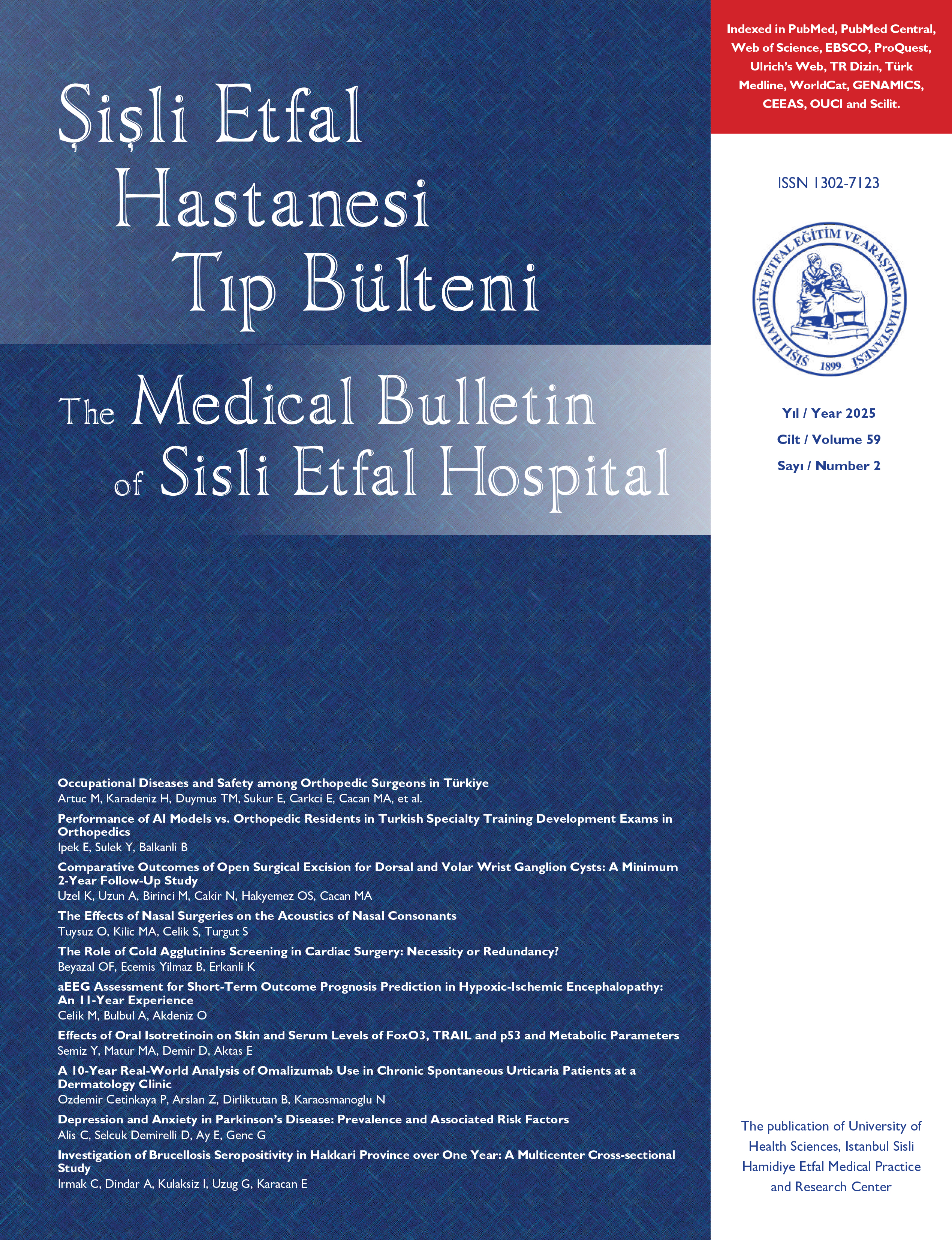
Rektal kanser için laparoskopik ve açık cerrahinin uzun süreli ve perioperatif sonuçları
Huseyin Onur Aydin1, Yahya Ekici1, Feza Yarbug Karakayali1, Tugan Tezcaner1, Gonca Ozgun2, Sedat Yıldırım1, Gokhan Moray11Department of General Surgery, Baskent University Faculty of Medicine, Ankara, Turkey2Department of Pathology, Baskent University Faculty of Medicine, Ankara, Turkey
Amaç: Rektum kanserinde minimal invaziv cerrahinin kullanımı ile onkolojik sonuçların karşılaştırılması gerekliliği ortaya çıkmıştır. Rektum kanserinde tedavi yaklaşımımızı değerlendirmek, laparoskopik ve açık cerrahi sonuçlarını karşılaştırmayı amaçladık.
Gereç ve Yöntem: Ocak 2006- Ocak 2016 yılları arasında kliniğimizde rektum karsinomu nedeniyle ameliyat edilen hastalar değerlendirildi. Sonuçlar açık ve laparoskopik cerrahi olarak iki grup arasında karşılaştırıldı. Cerrahi girişim sonrası klinik özellikler, preoperatif ve postoperatif sonuçlar; patolojik inceleme sonuçları ve hastalıksız sağkalım süreleri karşılaştırıldı.
Bulgular: Çalışmaya toplam 121 hasta dahil edildi. 50 hastaya açık, 71 hastaya laparoskopik cerrahi uygulandı. Açık cerrahi grubunda medyan takip süresi 56.75 ay; laparoskopik cerrahi grubunda hastaların medyan takip süresi 55.2 aydı. Patolojik incelemede her iki grupta benzer sayıda lenf nodu saptandı (p>0.05). Hastanede yatış süresi laparoskopik cerrahi grubunda açık cerrahi grubuna göre istatistiksel olarak anlamlı derecede düşük bulundu (p<0.05). Hastalıksız takip süresi açık cerrahi grubunda %74, laparoskopik cerrahi grubunda %82.5idi ve istatistiksel olarak anlamlı farklılık olmadığı görüldü (p>0.05).
Sonuç: Çalışmamızda rektum karsinomu için laparoskopik ve açık cerrahi arasında komplikasyon ve rekürrens açısından anlamlı farklılık olmadığı görüldü. Laparoskopik cerrahi grubunda bulunan hastaların hastanede kalış süresi açık cerrahi grubundan istatistiksel olarak anlamlı derecede düşüktü. Laparoskopik veya açık cerrahi seçenekleri, rektal kanser tedavisinde hastanın klinik uygunluğuna, cerrahın deneyimine ve merkez kaynaklarına göre tercih edilebilir.
Long-term and Perioperative Outcomes of Laparoscopic and Open Surgery for Rectal Cancer
Huseyin Onur Aydin1, Yahya Ekici1, Feza Yarbug Karakayali1, Tugan Tezcaner1, Gonca Ozgun2, Sedat Yıldırım1, Gokhan Moray11Department of General Surgery, Baskent University Faculty of Medicine, Ankara, Turkey2Department of Pathology, Baskent University Faculty of Medicine, Ankara, Turkey
Objectives: The necessity of comparing oncologic results with the use of minimally invasive surgery in rectal cancer has arisen. The aim of the present study was to evaluate the treatment approach in rectal cancer and to compare the outcomes of laparoscopic and open surgery.
Methods: Patients who underwent surgery for rectal carcinoma between January 2006 and January 2016 in our institution were evaluated. The results were compared between the two groups according to open or laparoscopic surgery. Clinical characteristics, preoperative and postoperative results, pathological examination results, and disease-free survival rates were compared after the surgical procedure.
Results: A total of 121 patients were included in the study. Of the patients, 50 underwent open, and 71 underwent laparoscopic surgery. The median follow-up times were 56.75 months in the open surgery group and 55.2 months in the laparoscopic surgery group. Pathological examination revealed similar numbers of lymph nodes in both groups (p>0.05). The duration of hospital stay was statistically significantly lower in the open surgery group than in the laparoscopic group (p<0.05). The rates of disease-free survival were 74% in the open surgery group and 82.5% in the laparoscopic group, and no statistically significant difference was found (p>0.05).
Conclusion: There was no significant difference in complication and recurrence between laparoscopic and open surgery for rectal cancer in our study. The duration of hospital stay of patients was statistically significantly lower in the laparoscopic group than in the open surgery group. Laparoscopic or open surgical options could be preferred according to the clinical suitability of the patient, experience of the surgeon, and resources of the center in rectal cancer treatment.
Makale Dili: İngilizce



















